Since 2014, the initiative “Pesticide Action Nexus Association (PAN) Ethiopia” has been training smallholder farmers in the production of organic cotton. The field schools are financed by PAN-Ethiopia with the help of the British NGO Textile Recycling Aid for International Development (TRAID). Five years ago, 200 farmers from the cooperative in Shelle Mella received the country’s first organic certifications. “There is an urgent need to extend the project to neighboring districts and increase the certification rate,” says PAN Ethiopia Managing Director Dr. Tadesse Amera Sahilu, who also works with GESAMTMASCHE’s Partner Africa projects. “The big challenge is to convince the textile and fashion industry to invest in farmers and their organic farming.”
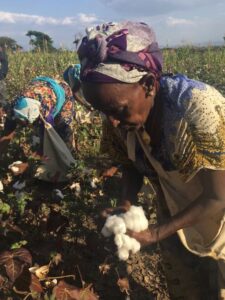
Female cotton farmers picking in Shelle Mella. There, around 200 small farmers have joined forces to form a cooperative that is certified according to the EU Organic Regulation. Image: GESAMTMASCHE
In the neighbouring communities of Shelle Mella, there are already about 5,000 other farmers who grow their cotton pesticide- and artificial fertilizer-free. But they can’t afford certifications. Hence, in the local market, organic cotton does not mean higher prices for the farmers. The contact of the small farmers only extends to the local ginnery, which ginns all cotton in the region and sells it on to the Capital. Together with GESAMTMASCHE, PAN-Ethiopia therefore wants to create contacts with manufacturers in Germany who either want to source organic cotton or have it spun in Ethiopia.
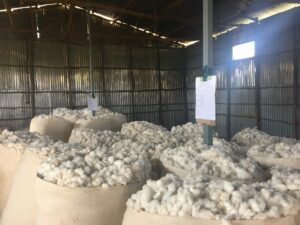
Image: GESAMTMASCHE; Cotton warehouse of the cooperative in Shelle Mella.
With the fully integrated textile factory MNS in Addis Ababa, initial approaches for better marketing have been developed. MNS is equipped with its own ginning plant and can technically drive the organic cotton in separate lines without any problems. “The problem is that our export customers only work with large quantities for finished goods. For such deliveries, the amount of organic fibre from Shelle Mella is simply not enough,” says MNS Export Manager Gokhan Gedik.
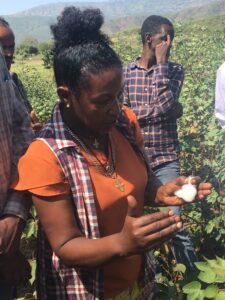
Cotton farmer in Chano Dargo: “The field schools are a great support for us and should definitely be continued.” Image: GESAMTMASCHE
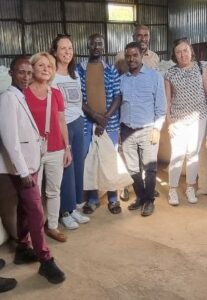
At Shelle Mella; Silvia Jungbauer, GESAMTMASCHE, Stephanie Weber, consultant in charge of German BMZ, Susanne Sattlegger, sequa, together with Mathewos Mecho, Past Chairman Shelle Mella Cotton Cooperative, Mesafint Worku, Chairman Shelle Mella Cotton Cooperative, Dr. Tadesse Amera Sahilu, PAN-Ethiopia, and Mesele Mekuria, Director Cotton Dept. of MOA.
“We very much hope to be able to continue our project work in Ethiopia in the coming years. Then organic cultivation, certification and networking with customers at home and abroad will be at the top of the agenda,” says Silvia Jungbauer from GESAMTMASCHE. “What has been achieved on a small scale in Shelle Mella has room for expansion. Thousands of smallholder farmers are all but ready for certification. Women can particularly benefit from the measures, both on the farms and in cotton processing.”
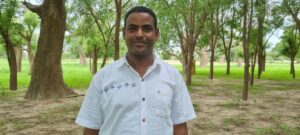
Dr. Tadesse Amera Sahilu
The PAN-Ethiopia Approach: Training of Trainers
“We pursue various agroecological methods to achieve high-yielding and high-quality organic cotton production in the southern Ethiopian Rift Valley. We provide hands-on training to several hundred farmers each year using the Farmer Field School (FFS) approach. Each farmer attends Farmer Field School for 20-24 weeks. In the following season, these FFS graduates serve as trainers to train up to five more farmers each.”
Dr. Tadesse Amera Sahilu, Managing Director PAN-Ethiopia